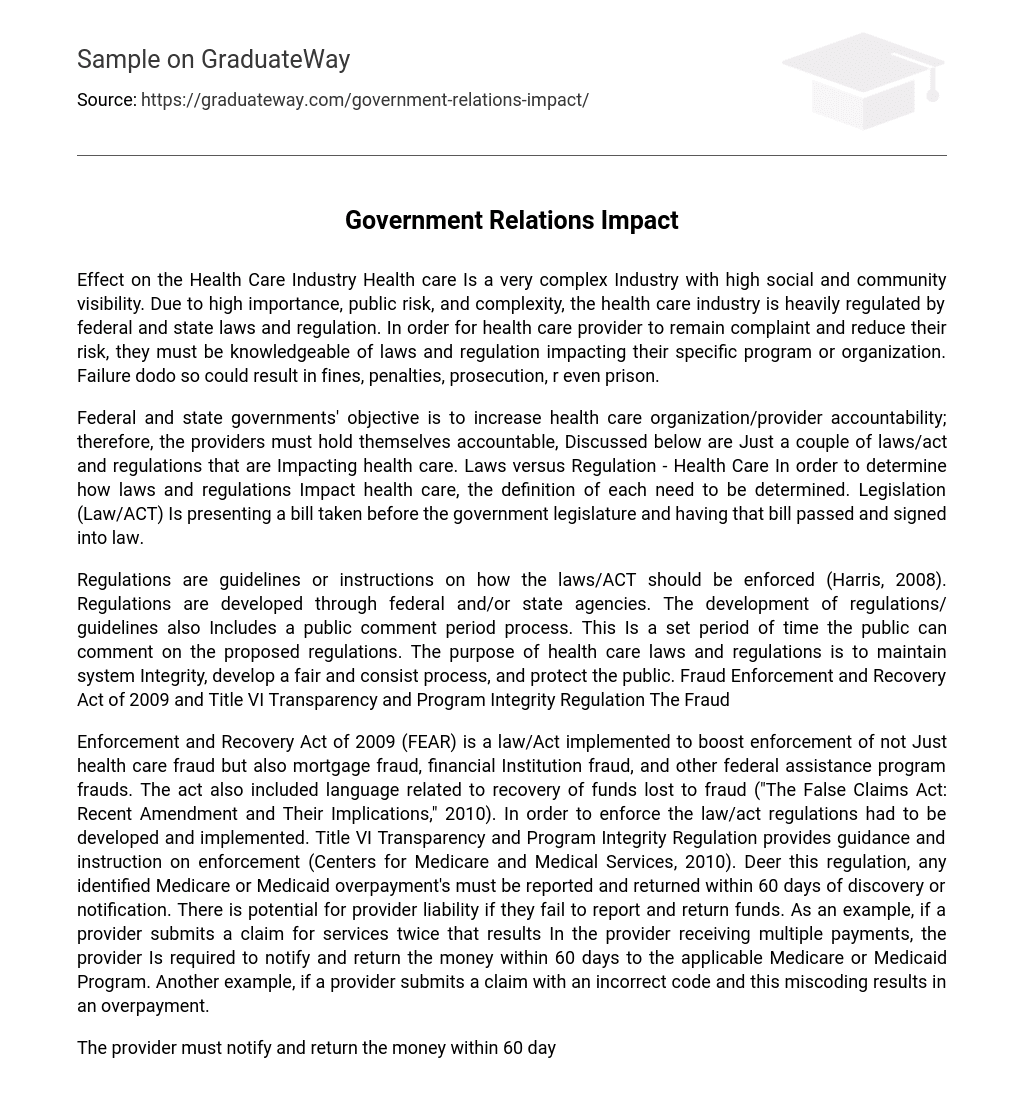Effect on the Health Care Industry Health care Is a very complex Industry with high social and community visibility. Due to high importance, public risk, and complexity, the health care industry is heavily regulated by federal and state laws and regulation. In order for health care provider to remain complaint and reduce their risk, they must be knowledgeable of laws and regulation impacting their specific program or organization. Failure dodo so could result in fines, penalties, prosecution, r even prison.
Federal and state governments’ objective is to increase health care organization/provider accountability; therefore, the providers must hold themselves accountable, Discussed below are Just a couple of laws/act and regulations that are Impacting health care. Laws versus Regulation – Health Care In order to determine how laws and regulations Impact health care, the definition of each need to be determined. Legislation (Law/ACT) Is presenting a bill taken before the government legislature and having that bill passed and signed into law.
Regulations are guidelines or instructions on how the laws/ACT should be enforced (Harris, 2008). Regulations are developed through federal and/or state agencies. The development of regulations/ guidelines also Includes a public comment period process. This Is a set period of time the public can comment on the proposed regulations. The purpose of health care laws and regulations is to maintain system Integrity, develop a fair and consist process, and protect the public. Fraud Enforcement and Recovery Act of 2009 and Title VI Transparency and Program Integrity Regulation The Fraud
Enforcement and Recovery Act of 2009 (FEAR) is a law/Act implemented to boost enforcement of not Just health care fraud but also mortgage fraud, financial Institution fraud, and other federal assistance program frauds. The act also included language related to recovery of funds lost to fraud (“The False Claims Act: Recent Amendment and Their Implications,” 2010). In order to enforce the law/act regulations had to be developed and implemented. Title VI Transparency and Program Integrity Regulation provides guidance and instruction on enforcement (Centers for Medicare and Medical Services, 2010). Deer this regulation, any identified Medicare or Medicaid overpayment’s must be reported and returned within 60 days of discovery or notification. There is potential for provider liability if they fail to report and return funds. As an example, if a provider submits a claim for services twice that results In the provider receiving multiple payments, the provider Is required to notify and return the money within 60 days to the applicable Medicare or Medicaid Program. Another example, if a provider submits a claim with an incorrect code and this miscoding results in an overpayment.
The provider must notify and return the money within 60 days of the discovery to the applicable Medicare or Medicaid program. Failure to comply with the 60 day rule could result In violation of the FEAR and result in fines or prosecution. 1 OFF Supplier Regulation Patient Protection and Affordable Care Act passed has five core objectives (Rosenberg, 2011). : 1 . Accomplish universal health care coverage for all Americans through federal government, state government, individuals, and employers programs. 2. Ensure health care insurance coverage is fair, quality, and affordable for all. 3.
Reduce fraud, waste, and abuse in the health care system by increasing accountability and improving quality. 4. Increase access to primary and preventative care, while at the same time reinforce the current primary care networks. 5. Expand clinical preventative care and community resources to increase public health. In order to enforce the Patient Protection and Affordable Care Act, Program Integrity and Provider Supplier Regulation was implemented. One area of concentration in this regulation requires state Medicaid programs update their information systems to be compatible with the national correct coding initiatives/ edits (INCH).
National Correct Coding Initiatives are edits that are put in place to prevent inappropriate reimbursement for certain code combinations or exceeding maximum number of units on a single date of service. As example, a provider should not bill two different Evaluation and Management CAP Codes for the same visit. If so, one of the codes should deny for the edit. Also, a provider should not bill a claim with multiple units of the same Evaluation and Management CAP code for the same visit. If so, both units should not be paid. INCH edits also cover codes hat are considered bundled codes; there, unbinding and billing separately is inappropriate.
State Medicaid programs historically did not implement INCH edits and this resulted in overpayment’s or inappropriate payments to providers. States still have the option to not implement certain INCH edits, if they are conflict with the state’s Medicaid benefits that have been approved by the Department of Health and Human Services. There are many other parts to this regulation that have impact on the Patient Protection and Affordable Care Act. Conclusion Both laws and regulations have a huge impact on the health care industry.
Impact is not Just on the health care delivery system but also impact the health care administration and reimbursement systems. Fraud Enforcement and Recovery Act of 2009 (FEAR) and Title VI Transparency and Program Integrity Regulation mandates that providers notify and refund any overpayment’s within 60 days of discovery and failure to do so puts the provider at risk for fines or prosecution. The objective is to make the provider accountable. One area of the Patient Protection and Affordable Care Act and Program Integrity and Provider Supplier Regulation required state
Medicaid Programs to update their information systems to be compatible with SMS National Correct Coding Initiatives. The objective was to reduce overpayment’s and inappropriate payments to providers. Health Care Administrators and their legal counsel need to remain current on both laws and regulations that impact the health care industry. This will help mitigate any potential risks.





